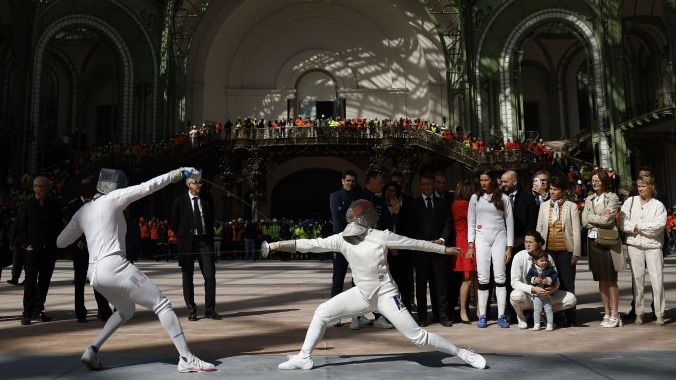The International Corruption Crisis Rocking Olympic Fencing
Photo by YOAN VALAT/POOL/EPA-EFE/Shutterstock
In April 2016, two sabre fencers faced off in a now-famous bout that would determine which of them would qualify for the 2016 Olympic games. Great Britain’s James Honeybone and Bulgaria’s Pancho Paskov stood in each other’s way in the quarterfinal round of the European qualification tournament. The bout began normally enough — Bulgaria’s Paskov claimed a modest early lead. But just three points into the match, it became apparent that something was off; Honeybone was visibly confused by referee Marius Florea’s calls.
As the bout progressed and call after call went Paskov’s way, Honeybone made frequent appeals to Florea, all to no avail. His only points came from when Paskov missed him entirely, or when it became too difficult to call anything else and still save face. In the end, Paskov won 15 to 7 and became an Olympian. The bout, in fencing circles, is widely considered a farce.
Fast forward to early this year, and an issue that has long been the subject of whispers and knowing looks has been given a very public voice. An explosive YouTube video, titled “Fencing’s Biggest Open Secret,” names Florea as well as several other highly rated and influential sabre referees and lays out a series of patterns and coincidences that paint a disturbing picture. The video was posted by “ponce de león fencing” — someone who only identified themself, even in an email conversation with Splinter, as a retired Olympic sabre fencer.
The video analyzes tournament footage and statistics to convey ponce de león’s suspicions about a small cadre of powerful referees and coaches — each invested in the success of specific athletes or national fencing programs — and suggests that they have bent or broken rules to give their preferred athletes a leg up in competition.
“Statistically unlikely things should not be happening at all but they appear to be happening regularly and only to the benefit of a very select group of people,” ponce de león told Splinter.
As the Paris Olympics loom, the video and other related allegations that have since emerged have dealt a serious blow to a sport otherwise known for elegance, sophistication, and camaraderie, and suggests that there is widespread corruption at the highest levels of fencing.
USA Fencing (USFA) has launched a formal investigation into the subject, and multiple fencers have retired over the refereeing situation including, recently, American Olympian Andrew Mackiewicz, whose public statement included “a call for integrity and honor.”
Sabre Fencing 101
For all of the ways that fencing can be hard to pick up and understand, especially for the casual onlooker, the rules of the game are actually quite simple: stay within the 14-meter-long strip (or piste) that makes up the field of play, stay in front of the opponent (no circling one another like in the movies), and hit the opponent before they hit you.
The intricacies of this simple dance, however, are extremely hard to spot, especially at the blinding pace at which modern sabre is fenced, as athletes leap at each other and whip their blades nearly too fast to see. It is so difficult to judge what happened in a given action that fencers assume their referee will make occasional errors and bad calls. In general, these errors are considered inevitable and quickly forgiven as part of the game.
-

-

-

-

-

-

-

-

-

-

-

-

-

-

-

-

-

-

-

-

-

-

-

-

-

-

-

-

-

-

-

-

-

-

-

-

-

-

-

-

-

-

-

-

-

-

-

-

-

-

-

-

-

-

-

-

-

-

-

-

-

-

-

-

-

-

-

-

-

-

-

-

-

-

-

-

-

-

-

-

-

-

-

-

-

-

-

-

-

-

-

-

-

-

-

-

-

-

-

-

-

-

-

-

-

-

-

-












































































































